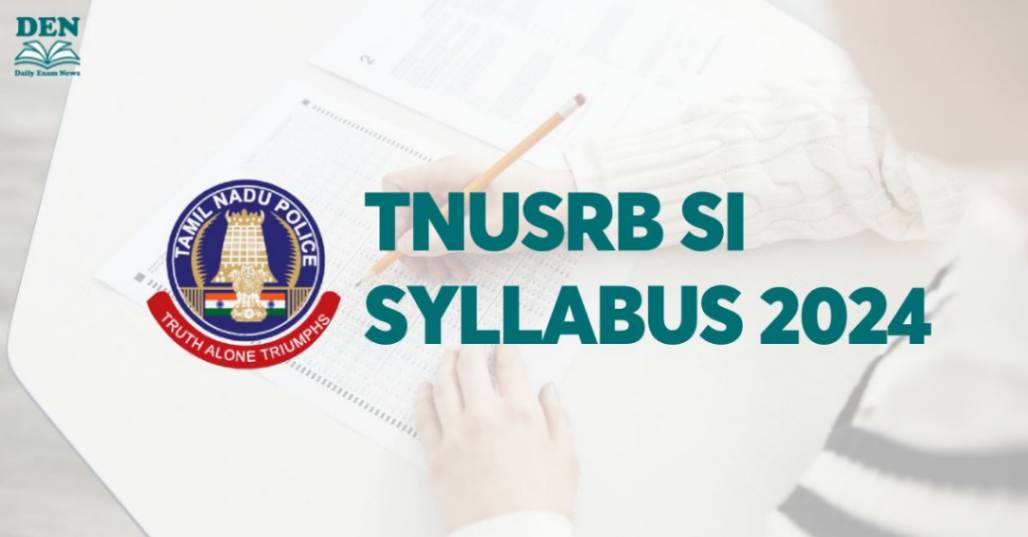The TNUSRB SI Syllabus 2024 will be out soon once the official notification comes out. But the aspirants can always examine the syllabus for 2023 to have an overview of the subjects to study. The exam will take place in a written format with objective type questions. This implies that there will be two papers: Paper I & Paper II. The candidates qualifying the Paper I will be eligible for taking the Paper II. Moreover, the exam pattern will differ for the open and departmental candidates respectively. The subjects from which the aspirants can expect questions include General Science, History, Political Science and Geography etc. To learn more about the same, continue reading the article.
| TNUSRB SI Syllabus Overview 2024 | |
| Exam Date | To Be Announced |
| Official Website | Click Here |
TNUSRB SI Syllabus 2024
The Tamil Nadu Special Forces, Taluk, Armed Forces, and Sub Inspector posts are filled through the TNUSRB SI exam. And the TNUSRB SI syllabus for Sub Inspector exam for Tamil Nadu state will comprise of two papers: Paper I & Paper II.
Paper 1 Syllabus
Paper I will comprise of subjects like History, Political Science, General science, Commerce, Geography and current affairs etc. The aspirants qualifying the exam will be eligible to sit for the Paper II. Gauge the table contents well to know more.
| Category | Subtopics |
| General Science | Electricity , Magnetism , Evolution , Nutrition , Human illnesses , Scientific tools , Discoveries |
| India’s History | Indus Valley Civilization, Important historical events, Major historical periods, Independence and post, independence history |
| Economics and Commerce | Industrial growth , Agriculture, Village government in Tamil Nadu, Social concerns and remedies in Tamil Nadu |
| Political Science | Constitution ,Citizenship, Legislative branch, Executive branch, Judicial branch, Foreign policy, Local self-government |
| Geography of India | Regions of India, Climatic variations, Monsoon, Natural disasters, Agriculture National park, Important ports, Population growth, Animals and forests |
| Current Events | Developments in Indian science and technology, Sports, Politics, Literature, International and national honors, Tamil Nadu’s arts, literature, and culture, India and its neighbors |
Paper 2 Syllabus
The syllabus for Paper 2 will consist of various subjects and they will vary for the open and departmental candidates. The exam will be in a written mode with objective type of questions. Examine the table below to know more.
| Category | Subtopics |
| Open Candidates | |
| Logical Analysis | Deductive reasoning, Inductive reasoning |
| Numerical Analysis | Arithmetic, Algebra, Data interpretation |
| Psychology Test | Personality assessment, Cognitive abilities |
| Communication Skills | Verbal communication, Written communication |
| Information Handling Ability | Data management, Information processing |
| Departmental Candidates | |
| Police Standing Order | Police regulations, Conduct rules |
| Police Administration | Organizational structure, Administrative procedures |
| Code of Criminal Procedure | Legal processes, Criminal proceedings |
| Indian Penal Code | Offenses, Penal provisions |
| Evidence Act | Admissibility of evidence, Legal standards |
TNUSRB SI Exam Pattern 2024
The exam pattern will vary for different categories which are Open candidates and Departmental candidates.To learn more about the same, continue reading.
Open Quota Candidates
This will include two sections which are Section I and Section II. Both the sections test a candidate’s abilities required for the position. There will be a language ability test and a primary written test. Keep reading the post for more details.
Section1: Tamil Language Eligibility Test
- Taking the Tamil Language Eligibility Test is qualifying in nature.
- There will be 100 questions on the objective-style paper, which will yield 100 marks. One hour and forty minutes will make up the entire 100-minute test.
- To have their OMR answer sheet for the main examination evaluated, a candidate needs to score at least 40 (40%) on the Tamil Language Eligibility Test.
- The Tamil Language Eligibility Test results will never be taken into consideration for constructing the provisional selection list.
- The Test is frequently given to applicants hoping to fill the 20% open quota of departmental applicants.
Section II: Primary Written Test
The primary written exam consists of two sections: Parts A and B.
- Part A: The first section of the paper focuses on the candidates’ general knowledge. There are 80 questions in Part A, each worth 40 marks. As a result, each question is worth 0.5 marks.
- Part B: There are sixty questions in this portion, each earning half a point, plus a lengthy syllabus. Part B is rated at thirty. There are just objective-style questions in both sections. It takes 2:30 hours to complete the paper. A minimum of 25 marks must be received by candidates in order for them to be considered for the next step of the selection process. Different types of objective questions are provided in both sections.
- Every suitable reply will get a half mark. Negative marking is not allowed. 70 total test marks.
Departmental and Open categories
This will include two sections which are Section I and Section II. Both the sections test a candidate’s abilities required for the position. There will be a language ability test and a primary written test. Keep reading the post for more details.
Section I: Tamil Language Proficiency Assessment
The qualifying conditions for the Tamil Language Eligibility Test are the same as those for open quota applicants.
Section II: Primary Written Test
- The primary written exam consists of two sections: Parts A and B.
- Part A: The first section of the paper focuses on the candidates’ general knowledge. Part A is worth 15 points and consists of 30 questions in total. As a result, each question is worth 0.5 marks.
- Part B: There are 140 questions in this section, each earning half a point, and a long syllabus. Part B carries 75 marks. There are just objective-type questions in both sections. It takes three hours to finish the paper. It takes at least 30 points for candidates to complete the test. The test will be of a total 85 marks.
| Parts | Number of Questions | Maximum Marks | Duration |
| Open Quota Candidates | |||
| Part A | 80 | 40 | 2:30 hours |
| Part B | 60 | 30 | |
| Total | 140 | 70 | |
| Departmental Quota Candidates | |||
| Part A | 30 | 15 | 3 hours |
| Part B | 140 | 70 | |
| Total | 170 | 85 | |
Check here for more information on other examinations-
Hopefully, this information was useful for all the aspiring candidates preparing for the government exams. Check DailyExamNews to stay informed about the latest recruitments, tests, vacancies, and developments regarding government exams.

